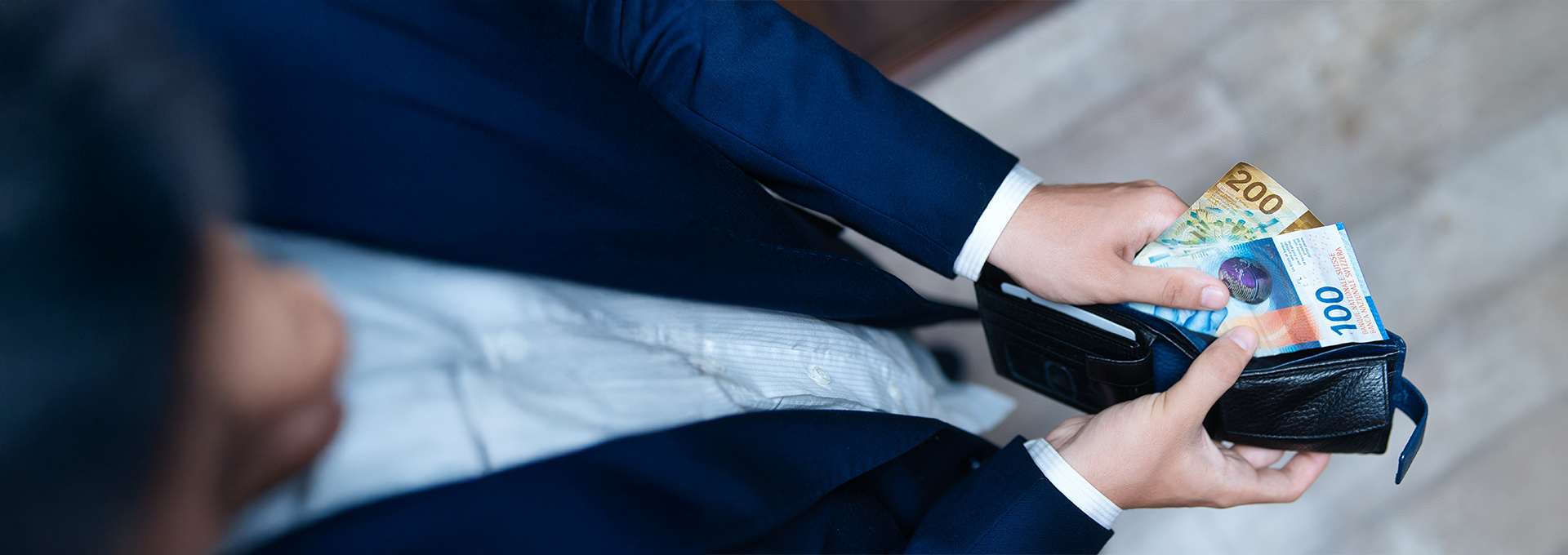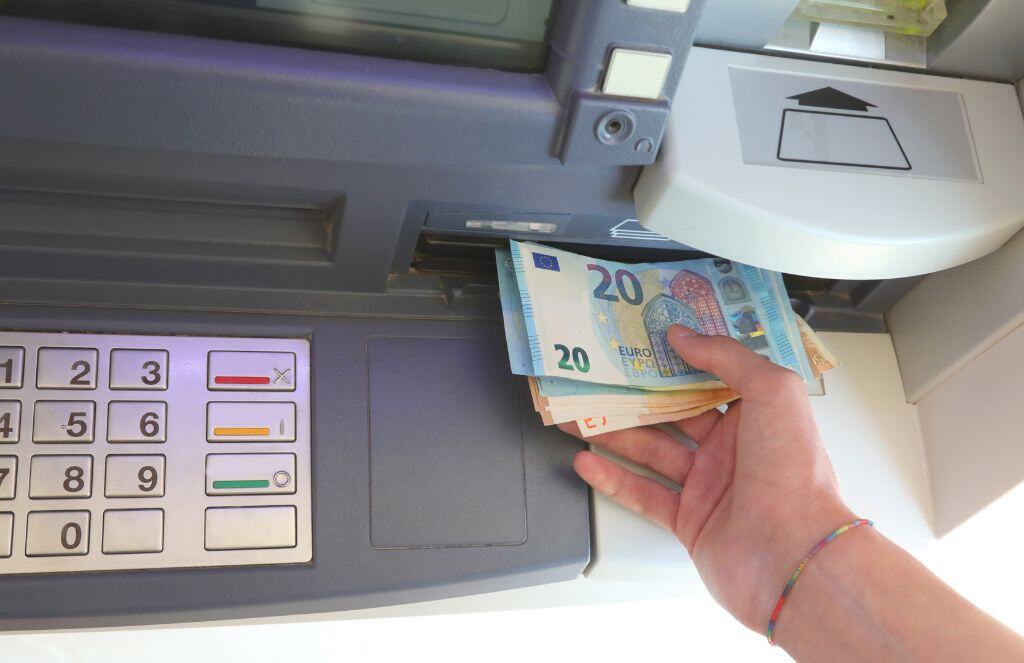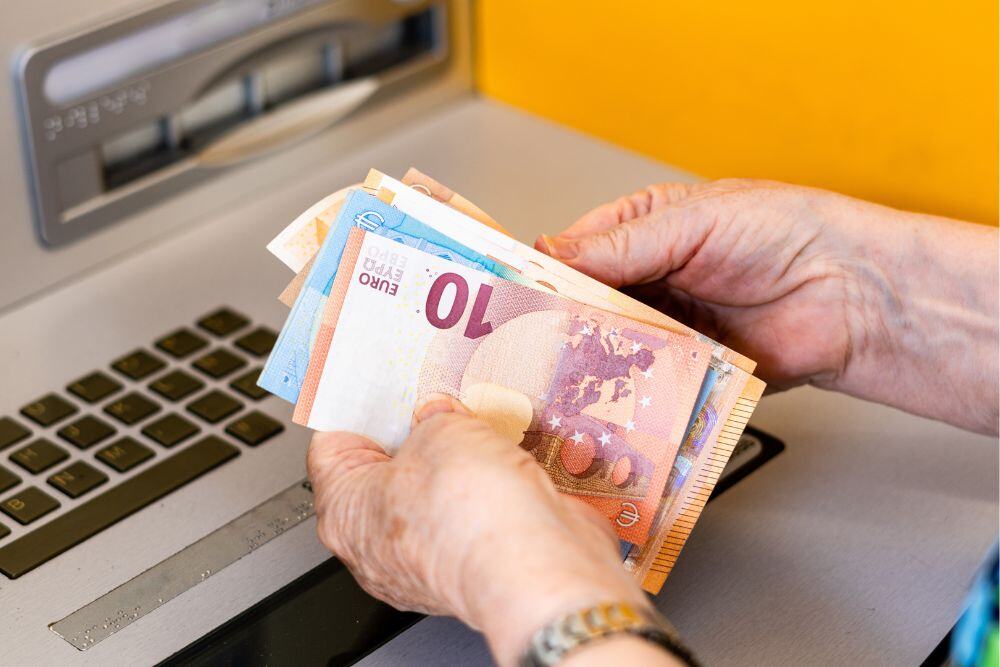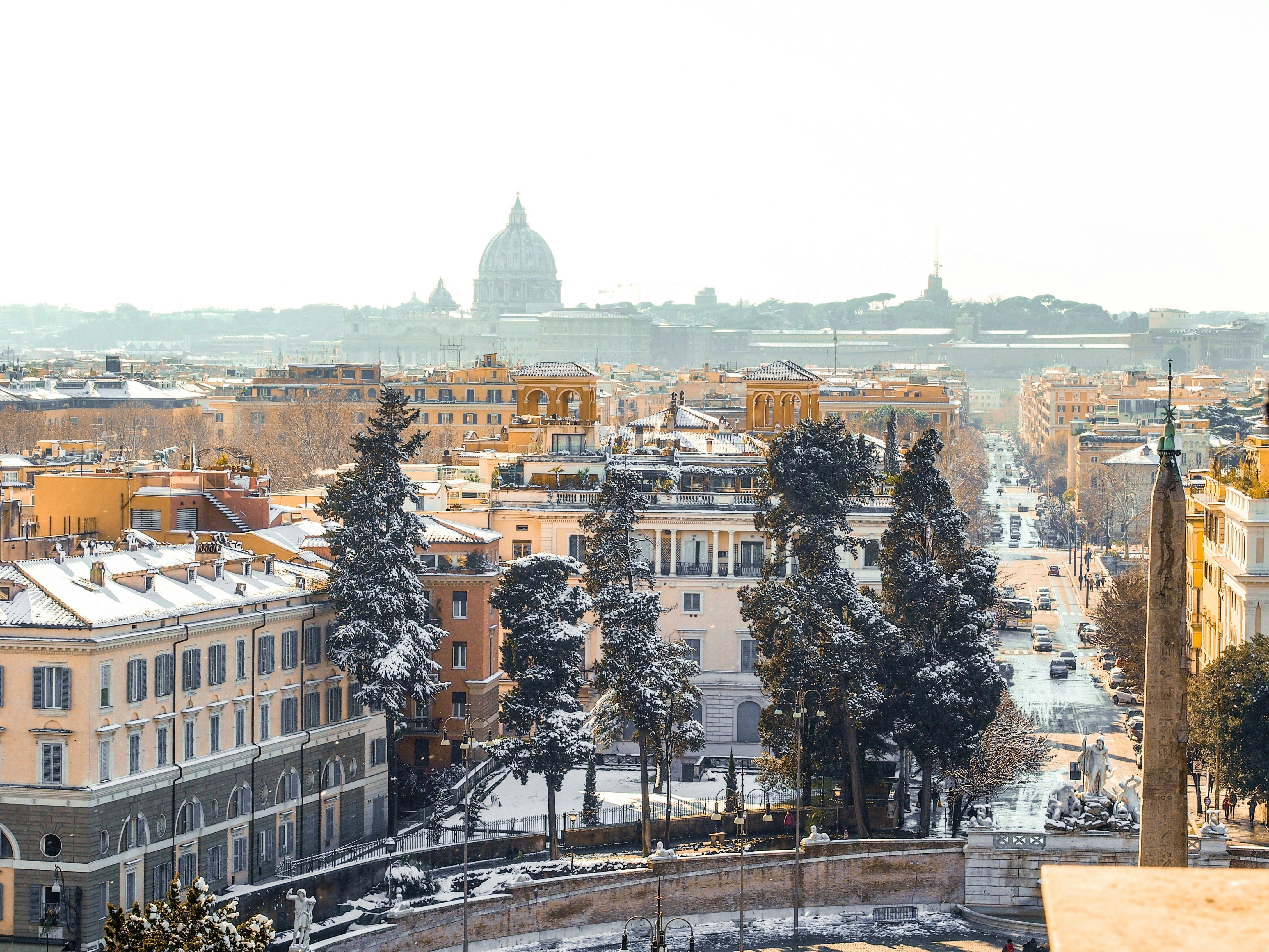Is Switzerland Cheap or Expensive? Spending Money Guide 2024
From the breathtaking Alps to its vibrant cities, Switzerland is one of the most popular countries for intrepid explorers to visit, offering a diverse landscape and an enchanting blend of nature, culture, and luxury. But how much does it cost to visit Switzerland?
At Crown Currency Exchange, we've put together the ultimate guide on how much spending money you'll need for a trip to Switzerland, taking into account your personal travel style and what you'd like to do when you reach this amazing destination.
How Much Spending Money Do I Need for Switzerland?
The amount of spending money you'll need for a trip to Switzerland will ultimately depend on your travel style. Whether you're trying to stick to a small budget or you want to holiday in the lap of luxury, here's what you can expect to spend across three different travel styles:
Budget Travellers
Anyone trying to stick to a smaller budget will need to allocate around ₣220 CHF (Swiss Francs) per day for a trip to Switzerland. This will provide accommodation in a hostel or mountain hut, allow you to buy groceries to cook breakfast and lunch, enjoy dinner at a food stall, and purchase a month-long travel ticket for public transport.
You'll also be able to enjoy low-cost guided tours of Old Town Zurich and visit amazing art galleries and museums, including the world-famous Kunsthaus Zurich.
Mid-range Travellers
A mid range budget would need to be around ₣460 CHF (Swiss Francs) per day. This will afford you comfortable, private accommodation in a bed and breakfast (with the first meal of your day included), meals at a mix of food stalls and traditional Swiss restaurants, and travel by both public transport and taxi.
In terms of activities, you'll be able to enjoy cruising and exploring Lake Lucerne and visit the ever-popular Pilatus Luzern, which is home itself to a plethora of fun activities.
Luxury Travellers
Those looking to create the holiday of a lifetime where no expense is spared should budget around ₣1000 CHF (Swiss Francs) per day. While this may seem quite high, it's important to remember that Switzerland is quite an expensive country, and its luxury amenities come at a premium price.
Within this budget, you'll be able to stay in a luxury hotel room, enjoy Michelin-starred restaurant meals, and hire a car. You'll also be able to paraglide around the Matterhorn and take a culinary walking tour of Lucerne.
What Goes into a Travel Budget?

- Food & Drink: From local cafes to Michelin-starred restaurants, there are some incredible places to eat in Switzerland, but you'll need to think about how much you're able to spend on food and drink.
- Accommodation: You're going to need somewhere to sleep and act as a base while you're in Switzerland too, so a large portion of your travel budget will need to go on accommodation costs.
- Activities: No trip to Switzerland is complete without taking part in some amazing activities, so be sure to put aside some spending money to enjoy day trips as well.
- Transportation: Knowing how much it's going to cost to get around Switzerland is also important, so a portion of your budget will need to be allocated to transportation.
What is the Cost of Accommodation in Switzerland?

The amount of money you'll need to budget for when looking into accommodation in Switzerland will vary widely depending on where you'd like to stay. The cheapest is hostels, which cost as little as ₣60 CHF (Swiss Francs) per night, and the most expensive is luxury hotels, which can cost up to ₣250 CHF (Swiss Francs) per night.
- Budget Travellers: Those looking to keep their accommodation costs as low as possible would be better off choosing hostels or mountain huts, each of which costs less than ₣80 CHF (Swiss Francs) per night on average.
- Mid-Range Travellers: Those with a slightly higher budget or who simply want to keep things a little more 'high end' may find that bed and breakfast accommodation is the best option. This type of accommodation will cost an average of ₣110 CHF (Swiss Francs) per night.
- Luxury Travellers: Those with large budgets can enjoy luxury hotels or hire entire apartments through Airbnb. Prices vary widely depending on the size of the property or the star rating of the hotel room, but on average, luxury travellers can expect to spend up to ₣250 CHF (Swiss Francs) per night.
Different Accommodation Options:
- Hostels: Perfect for those looking to spend as little money on accommodation as possible, a single night in a shared room in a Swiss hostel costs an average price of ₣60 CHF (Swiss Francs).
- Bed and Breakfasts: Another great option if you're looking to keep your accommodation costs low but value your privacy, a comfortable room with breakfast included will cost around ₣110 CHF (Swiss Francs) per night.
- Mountain Huts: Ideal if you're looking for a unique place to stay, mountain huts offer basic accommodation for hikers and are a great alternative to camping. It's also one of the most affordable options, costing an average of ₣75 CHF (Swiss Francs) per night with meals included.
- Airbnb Rental: Whether you're a couple looking for as much privacy as possible or you're travelling with a group of friends, an Airbnb rental is another good accommodation option when visiting Switzerland. Your costs will vary depending on the size of the property, but on average, you can expect to spend ₣170 CHF (Swiss Francs) per night.
- Luxury Hotels: Switzerland is home to some of the world's most luxurious hotels, and these are perfect for anyone looking to create a truly memorable stay. However, they are the most expensive option, and one night will set you back an average of ₣250 CHF (Swiss Francs).
Our Money-Saving Tips for Accommodation Costs:
- Visit Switzerland Off-Season: Just like every other country, Switzerland has a low travel season, and accommodation prices fall between late autumn and early spring.
- Choose Accommodation That Includes Meals: You can save money on your overall budget by booking accommodation that includes meals, such as a bed and breakfast or a mountain hut stay.
What is the Cost of Food in Switzerland?

Switzerland is well-known for its food and drink scene, and there's an option for every taste and budget. Here are some of your dining options in Switzerland, along with their average prices:
- Street Food and Food Trucks: Particularly abundant in a large city centre, street food stalls and trucks offer a variety of dishes, from gourmet burgers to ethnic street food. You can keep costs relatively low by eating this way, with the average dish costing just ₣20 CHF (Swiss Francs), but make sure you check out each establishment's hygiene standards before you order.
- Swiss Markets: One of the best ways of experiencing the local produce that Switzerland has to offer is by visiting a Swiss market. Here, you'll be able to sample ingredients and ready-made meals that can be taken away for eating later, which is ideal if your aim is to cook for yourself. Prices vary depending on what you buy, but as a guide, a week's worth of ingredients will cost around ₣150 CHF (Swiss Francs).
- Traditional Restaurants: Ideal if you want to experience authentic Swiss dishes like cheese fondue, raclette, rosti, and Zurcher Geschnetzeltes (sliced veal in a creamy sauce), a three-course meal for two people in a traditional restaurant will cost around ₣150 CHF (Swiss Francs).
- Fine Dining Restaurants: With so many Michelin-starred restaurants to enjoy in Switzerland, it's worth visiting at least one during your stay. However, this is very budget-dependent, and you can expect to pay around ₣70 CHF (Swiss Francs) per dish!
Our Money-Saving Tips for Food Costs:
- Cook For Yourself: One of the easiest ways to save money on your food costs is by cooking for yourself. Visit a Swiss market for essentials and use your accommodation's self-catering facilities to cook breakfast and make a packed lunch.
- Mix Things Up: Remember, you don't have to dine in the same way each night. Should you want to try some Michelin-starred restaurant meals, mix things up by eating at food stalls or catering for yourself in the run-up to your booking.
What is the Cost of Transport in Switzerland?

When it comes to travelling around Switzerland, you have plenty of good options available to you. Of course, each is better suited for different budgets, so here's the average price of each:
- Public Transportation: Switzerland boasts some of the best public transportation links in Europe and has a network of reliable trains, buses, and trams that are convenient and easy to use. It's also inexpensive, with the average price of a one-way trip costing ₣5 CHF (Swiss Francs).
- Taxis: For destinations that aren't easily reached by public transportation, a taxi could be your next best option. This is a little more expensive, however, and you can expect to pay an initial fee of ₣6CHF (Swiss Francs) followed by a further ₣5CHF (Swiss Francs) per kilometre.
- Biking: One of the best ways of getting around and exploring Switzerland is by hiring a bike. This will cost an average of ₣35 CHF (Swiss Francs), and many cities have designated biking trails that make it safer to ride through urban areas.
- Car Rental: While some travellers enjoy the freedom and independence offered by hiring a rental car, it can be a costly option, and the average price comes in at ₣90 CHF (Swiss Francs) per day. On top of this, you'll need to factor in fuel prices too, which costs around ₣2 CHF (Swiss Francs) per litre.
Our Money-Saving Tips for Transportation Costs:
- Buy A Monthly Ticket: There's no doubt that Switzerland's public transportation system is the cheapest and most convenient way of getting around. However, multiple trips can soon start adding up. So, to keep costs low, purchase a monthly ticket for ₣90 CHF (Swiss Francs), and you'll be offered unlimited travel without accidentally piling up your costs.
- Split The Cost: While hiring a rental car is expensive, splitting the costs between a group can work out quite well. For instance, a group of four people using the same rental car will bring the average price down to ₣22 CHF (Swiss Francs) per person per day.
What is the Cost of Activities in Switzerland?

From thrill-seeking activities to relaxing river cruises, Switzerland has an activity to suit every need and budget. Here are some of our favourites, along with their average costs:
- Cruise Lake Lucerne: One of Switzerland's most beautiful lakes, Lake Lucerne is best explored from both the water and the surrounding land. You can explore this amazing area by taking a guided walking and boat trip for ₣95 CHF (Swiss Francs).
- Visit Pilatus Luzern: Home to five different restaurants, incredible walking trails, and outdoor activities, Pilatus Luzern offers something for everyone. One of the most popular activities here is a self-guided cable car tour, which costs ₣63 CHF (Swiss Francs) per person.
- Take A Tour Of Old Town Zurich: Steeped in history and home to some of the most beautiful buildings in Switzerland, Old Town is ideal for those looking to learn more about Zurich as well as indulge in some retail therapy. You can also join a walking tour for just ₣9 CHF (Swiss Francs).
- Paraglide Around The Matterhorn: One for the thrill-seekers, take the skies and glide around the famous Matterhorn, which sits on the border between Switzerland and Italy. The entire experience lasts around 25 minutes and costs ₣310 CHF (Swiss Francs) per person.
- Enjoy The Lucerne "CH" Experience: Ideal if you're looking for a way to mix Switzerland's famous chocolate and cheese crafts with a tour of castle and chapels, the Lucerne "CH" Experience costs ₣153 CHF (Swiss Francs) per person.
- Visit Kunsthaus Zurich: Switzerland's largest art museum, Kunsthaus Zurich boasts historic and modern exhibits that any art-lover simply needs to see. Admission is free, although some exhibits are ticketed.
Our Money-Saving Tips for Activity Costs:
- Book In Advance: One of the best ways of keeping your activity costs low is to book your day trips in advance or as part of a package, as some tour operators will offer discounts when you do this.
- Research Free Entry: Many art galleries and museums offer free entry at certain times of the year or on set days throughout the week, so be sure to take a look at their websites to see if there are times when you can get in for free!
Other Expenses to Consider for the Trip

- Travel Insurance: This is often overlooked in favour of more exciting aspects of a trip, but travel insurance is an essential part of any holiday. A good policy will cover you for lost luggage, cancelled trips, medical emergencies, and more.
- Visas & Documentation: You'll also need to check if you need a visa to visit Switzerland and how much that will cost. Likewise, make sure your passport is in date and, if not, factor in the renewal costs.
- Souvenirs: Be sure to put a little money aside for gifts and souvenirs as well, whether they're for you or your friends and family, it's always nice to have a memento of your travels.
- Tipping: This is also often forgotten about when planning a budget, but most restaurants will expect you to tip waiting staff at the end of your meal. Likewise, you may also want to tip taxi drivers and tour guides.
- Emergency Fund: It's also a very good idea to have a set amount of money put aside to cover any emergencies not included in your travel insurance policy.
Most Cost-Effective Way to Take Swiss Francs to Switzerland
While you can use payment cards when visiting Switzerland, each transaction is likely to incur an additional "International Transaction Fee", and this can soon add up if you're using your card multiple times throughout the day. As such, we recommend taking Swiss Francs in cash when you visit Switzerland.
Not only is this the most cost effective way of taking your spending money to Switzerland, but when you use Crown Currency Exchange, you'll also be offered highly competitive AUD to CHF rates and you won't be charged any commission fees. You can find all of the information you need on buying Swiss Francs here, as well as your closest Crown Currency Exchange store here.
FAQs
Is Switzerland expensive to visit?
Compared to some other European destinations, Switzerland is an expensive country to visit. However, as with any trip, you can keep your costs low through careful planning and budgeting.
Can I use cards to pay in Switzerland?
It is possible to pay using cards in Switzerland, but doing so may incur additional fees from your bank or credit card provider. With this in mind, the best way of taking spending money to Switzerland is in cash.
What currency does Switzerland use?
The currency used in Switzerland is the Swiss Franc (CHF)
How Much Spending Money Do I Need for Switzerland?
The amount of spending money you'll need for a trip to Switzerland will ultimately depend on your travel style. Whether you're trying to stick to a small budget or you want to holiday in the lap of luxury, here's what you can expect to spend across three different travel styles:
Budget Travellers
Anyone trying to stick to a smaller budget will need to allocate around ₣220 CHF (Swiss Francs) per day for a trip to Switzerland. This will provide accommodation in a hostel or mountain hut, allow you to buy groceries to cook breakfast and lunch, enjoy dinner at a food stall, and purchase a month-long travel ticket for public transport.
You'll also be able to enjoy low-cost guided tours of Old Town Zurich and visit amazing art galleries and museums, including the world-famous Kunsthaus Zurich.
Mid-range Travellers
A mid range budget would need to be around ₣460 CHF (Swiss Francs) per day. This will afford you comfortable, private accommodation in a bed and breakfast (with the first meal of your day included), meals at a mix of food stalls and traditional Swiss restaurants, and travel by both public transport and taxi.
In terms of activities, you'll be able to enjoy cruising and exploring Lake Lucerne and visit the ever-popular Pilatus Luzern, which is home itself to a plethora of fun activities.
Luxury Travellers
Those looking to create the holiday of a lifetime where no expense is spared should budget around ₣1000 CHF (Swiss Francs) per day. While this may seem quite high, it's important to remember that Switzerland is quite an expensive country, and its luxury amenities come at a premium price.
Within this budget, you'll be able to stay in a luxury hotel room, enjoy Michelin-starred restaurant meals, and hire a car. You'll also be able to paraglide around the Matterhorn and take a culinary walking tour of Lucerne.
What Goes into a Travel Budget?
- Food & Drink: From local cafes to Michelin-starred restaurants, there are some incredible places to eat in Switzerland, but you'll need to think about how much you're able to spend on food and drink.
- Accommodation: You're going to need somewhere to sleep and act as a base while you're in Switzerland too, so a large portion of your travel budget will need to go on accommodation costs.
- Activities: No trip to Switzerland is complete without taking part in some amazing activities, so be sure to put aside some spending money to enjoy day trips as well.
- Transportation: Knowing how much it's going to cost to get around Switzerland is also important, so a portion of your budget will need to be allocated to transportation.
What is the Cost of Accommodation in Switzerland?
The amount of money you'll need to budget for when looking into accommodation in Switzerland will vary widely depending on where you'd like to stay. The cheapest is hostels, which cost as little as ₣60 CHF (Swiss Francs) per night, and the most expensive is luxury hotels, which can cost up to ₣250 CHF (Swiss Francs) per night.
- Budget Travellers: Those looking to keep their accommodation costs as low as possible would be better off choosing hostels or mountain huts, each of which costs less than ₣80 CHF (Swiss Francs) per night on average.
- Mid-Range Travellers: Those with a slightly higher budget or who simply want to keep things a little more 'high end' may find that bed and breakfast accommodation is the best option. This type of accommodation will cost an average of ₣110 CHF (Swiss Francs) per night.
- Luxury Travellers: Those with large budgets can enjoy luxury hotels or hire entire apartments through Airbnb. Prices vary widely depending on the size of the property or the star rating of the hotel room, but on average, luxury travellers can expect to spend up to ₣250 CHF (Swiss Francs) per night.
Different Accommodation Options:
- Hostels: Perfect for those looking to spend as little money on accommodation as possible, a single night in a shared room in a Swiss hostel costs an average price of ₣60 CHF (Swiss Francs).
- Bed and Breakfasts: Another great option if you're looking to keep your accommodation costs low but value your privacy, a comfortable room with breakfast included will cost around ₣110 CHF (Swiss Francs) per night.
- Mountain Huts: Ideal if you're looking for a unique place to stay, mountain huts offer basic accommodation for hikers and are a great alternative to camping. It's also one of the most affordable options, costing an average of ₣75 CHF (Swiss Francs) per night with meals included.
- Airbnb Rental: Whether you're a couple looking for as much privacy as possible or you're travelling with a group of friends, an Airbnb rental is another good accommodation option when visiting Switzerland. Your costs will vary depending on the size of the property, but on average, you can expect to spend ₣170 CHF (Swiss Francs) per night.
- Luxury Hotels: Switzerland is home to some of the world's most luxurious hotels, and these are perfect for anyone looking to create a truly memorable stay. However, they are the most expensive option, and one night will set you back an average of ₣250 CHF (Swiss Francs).
Our Money-Saving Tips for Accommodation Costs:
- Visit Switzerland Off-Season: Just like every other country, Switzerland has a low travel season, and accommodation prices fall between late autumn and early spring.
- Choose Accommodation That Includes Meals: You can save money on your overall budget by booking accommodation that includes meals, such as a bed and breakfast or a mountain hut stay.
What is the Cost of Food in Switzerland?
Switzerland is well-known for its food and drink scene, and there's an option for every taste and budget. Here are some of your dining options in Switzerland, along with their average prices:
- Street Food and Food Trucks: Particularly abundant in a large city centre, street food stalls and trucks offer a variety of dishes, from gourmet burgers to ethnic street food. You can keep costs relatively low by eating this way, with the average dish costing just ₣20 CHF (Swiss Francs), but make sure you check out each establishment's hygiene standards before you order.
- Swiss Markets: One of the best ways of experiencing the local produce that Switzerland has to offer is by visiting a Swiss market. Here, you'll be able to sample ingredients and ready-made meals that can be taken away for eating later, which is ideal if your aim is to cook for yourself. Prices vary depending on what you buy, but as a guide, a week's worth of ingredients will cost around ₣150 CHF (Swiss Francs).
- Traditional Restaurants: Ideal if you want to experience authentic Swiss dishes like cheese fondue, raclette, rosti, and Zurcher Geschnetzeltes (sliced veal in a creamy sauce), a three-course meal for two people in a traditional restaurant will cost around ₣150 CHF (Swiss Francs).
- Fine Dining Restaurants: With so many Michelin-starred restaurants to enjoy in Switzerland, it's worth visiting at least one during your stay. However, this is very budget-dependent, and you can expect to pay around ₣70 CHF (Swiss Francs) per dish!
Our Money-Saving Tips for Food Costs:
- Cook For Yourself: One of the easiest ways to save money on your food costs is by cooking for yourself. Visit a Swiss market for essentials and use your accommodation's self-catering facilities to cook breakfast and make a packed lunch.
- Mix Things Up: Remember, you don't have to dine in the same way each night. Should you want to try some Michelin-starred restaurant meals, mix things up by eating at food stalls or catering for yourself in the run-up to your booking.
What is the Cost of Transport in Switzerland?
When it comes to travelling around Switzerland, you have plenty of good options available to you. Of course, each is better suited for different budgets, so here's the average price of each:
- Public Transportation: Switzerland boasts some of the best public transportation links in Europe and has a network of reliable trains, buses, and trams that are convenient and easy to use. It's also inexpensive, with the average price of a one-way trip costing ₣5 CHF (Swiss Francs).
- Taxis: For destinations that aren't easily reached by public transportation, a taxi could be your next best option. This is a little more expensive, however, and you can expect to pay an initial fee of ₣6CHF (Swiss Francs) followed by a further ₣5CHF (Swiss Francs) per kilometre.
- Biking: One of the best ways of getting around and exploring Switzerland is by hiring a bike. This will cost an average of ₣35 CHF (Swiss Francs), and many cities have designated biking trails that make it safer to ride through urban areas.
- Car Rental: While some travellers enjoy the freedom and independence offered by hiring a rental car, it can be a costly option, and the average price comes in at ₣90 CHF (Swiss Francs) per day. On top of this, you'll need to factor in fuel prices too, which costs around ₣2 CHF (Swiss Francs) per litre.
Our Money-Saving Tips for Transportation Costs:
- Buy A Monthly Ticket: There's no doubt that Switzerland's public transportation system is the cheapest and most convenient way of getting around. However, multiple trips can soon start adding up. So, to keep costs low, purchase a monthly ticket for ₣90 CHF (Swiss Francs), and you'll be offered unlimited travel without accidentally piling up your costs.
- Split The Cost: While hiring a rental car is expensive, splitting the costs between a group can work out quite well. For instance, a group of four people using the same rental car will bring the average price down to ₣22 CHF (Swiss Francs) per person per day.
What is the Cost of Activities in Switzerland?
From thrill-seeking activities to relaxing river cruises, Switzerland has an activity to suit every need and budget. Here are some of our favourites, along with their average costs:
- Cruise Lake Lucerne: One of Switzerland's most beautiful lakes, Lake Lucerne is best explored from both the water and the surrounding land. You can explore this amazing area by taking a guided walking and boat trip for ₣95 CHF (Swiss Francs).
- Visit Pilatus Luzern: Home to five different restaurants, incredible walking trails, and outdoor activities, Pilatus Luzern offers something for everyone. One of the most popular activities here is a self-guided cable car tour, which costs ₣63 CHF (Swiss Francs) per person.
- Take A Tour Of Old Town Zurich: Steeped in history and home to some of the most beautiful buildings in Switzerland, Old Town is ideal for those looking to learn more about Zurich as well as indulge in some retail therapy. You can also join a walking tour for just ₣9 CHF (Swiss Francs).
- Paraglide Around The Matterhorn: One for the thrill-seekers, take the skies and glide around the famous Matterhorn, which sits on the border between Switzerland and Italy. The entire experience lasts around 25 minutes and costs ₣310 CHF (Swiss Francs) per person.
- Enjoy The Lucerne "CH" Experience: Ideal if you're looking for a way to mix Switzerland's famous chocolate and cheese crafts with a tour of castle and chapels, the Lucerne "CH" Experience costs ₣153 CHF (Swiss Francs) per person.
- Visit Kunsthaus Zurich: Switzerland's largest art museum, Kunsthaus Zurich boasts historic and modern exhibits that any art-lover simply needs to see. Admission is free, although some exhibits are ticketed.
Our Money-Saving Tips for Activity Costs:
- Book In Advance: One of the best ways of keeping your activity costs low is to book your day trips in advance or as part of a package, as some tour operators will offer discounts when you do this.
- Research Free Entry: Many art galleries and museums offer free entry at certain times of the year or on set days throughout the week, so be sure to take a look at their websites to see if there are times when you can get in for free!












.png)

